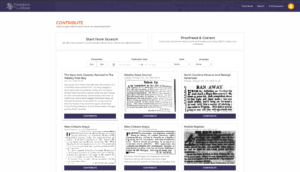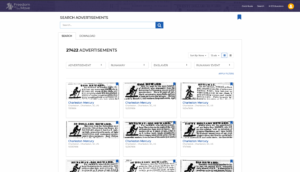Freedom on the Move: How Runaway Ads Contribute to African-American Family History
 With the events going on at this time, many people are looking back in history to reflect on the difficult journey to freedom for minorities in the United States, particularly the black population. Anyone who has taken a U. S. History course should be aware of the horrific institution of slavery and its overall impact on not just U.S. society, but also on the family structure of blacks in general. Because of internal slave trade and general blatant disregard for human rights and privileges, many black families were separated and family members had great difficulty in keeping track of who went where. In fact, after the Civil War, many freed slaves began publishing ads for help in relocating their family members, hoping to reunite with them.
With the events going on at this time, many people are looking back in history to reflect on the difficult journey to freedom for minorities in the United States, particularly the black population. Anyone who has taken a U. S. History course should be aware of the horrific institution of slavery and its overall impact on not just U.S. society, but also on the family structure of blacks in general. Because of internal slave trade and general blatant disregard for human rights and privileges, many black families were separated and family members had great difficulty in keeping track of who went where. In fact, after the Civil War, many freed slaves began publishing ads for help in relocating their family members, hoping to reunite with them.
Fortunately, there has been a general increase of interest in African American history, particularly family history. In 2012 Heather Andrea Williams published Help Me to Find My People, a historical narrative where she explores the accounts of slaves and how they “were able to create new families—marry again, have children—while at the same time keeping an emotional space for those whom they had lost.”[i] In Utah, several scholars from the University of Utah and the Church History Library, including Ardis Parshall and Paul Reeve, created a website titled Century of Black Mormons. This website is dedicated in telling the stories of black members of The Church of Jesus Christ of Latter-day Saints who joined between 1830 and 1930. It has been an ongoing project since 2012, and you can visit the website here.
 Just last year, a new project headed by Cornell University, was created and announced. This project, Freedom on the Move, is an ongoing database of fugitive slaves, usually depicted in runaway ads. This is a really great resource for African American family history for a few reasons:
Just last year, a new project headed by Cornell University, was created and announced. This project, Freedom on the Move, is an ongoing database of fugitive slaves, usually depicted in runaway ads. This is a really great resource for African American family history for a few reasons:
- The database is searchable, and you can look for slaves, slave masters, locations, and dates.
- You can actively contribute by indexing the ads and making them more accessible for future research.
- The runaway ads provide key descriptions of the fugitive slave not usually found in genealogical records. Often, the publisher will provide details about the slave, such as what languages they spoke, what kind of clothes they wore for disguise, and how they presented themselves. They can also provide hints as to other family members in other places.
There are a couple of ways to use the website and get involved in making these ads more accessible:
Contribute
Similar to FamilySearch Indexing, Freedom on the Move allows visitors to come and index runaway ads after creating a free account. To get started, visit freedomonthemove.org and click “Access the Database.”
The main database page opens in a new tab. Click “Register” to create a new account. Fill out the dialog boxes and click “Register.” You have the option to make your name public, meaning that any indexing you do will be recorded with your name as a subscriber. You can always change this in settings. Once your account is made, click “Contribute.” Then select “Extract Data.”
In the Contribute page, you can select “Start from Scratch,” “Proofread and Correct,” or one of the various newspaper ads listed below. You also have the option to search for an ad in the search bars, by added transcription, publication date, publication place, or language. Once you select an option, follow the instructions and start indexing the ad.

You also have the option to “Group Advertisements,” which allows you to scroll through and group several ads that talk about the same fugitive. This can be helpful in understanding the profound impact that a slave had in running away and how difficult it was for them to successfully escape.
Search
If you want to search the database, click “Search.” You can then type in the search bar or fill out one of the four categories below: Advertisement, Runaway, Enslaver, or Runaway Event. You can also sort the search results by publication date, change how the results are presented, and choose how many are shown per page.
You also have the option to download the search results. To do that, click the “Download” tab and fill out the search bar information. Then scroll down and click any checkbox next to the information that you want included. You can also change the format for how you want the search results to be presented, as well as the number of results. For information on terms found in the downloaded spreadsheet, click “Table Info.”
Why It Matters
Some people might wonder why runaway ads are so important. As I mentioned before, the ads help us to know what life was like for many blacks in America prior to the end of the Civil War. Freedom on the Move puts it this way: “Created to control the movement of enslaved people, the ads ultimately preserved the details of individual lives—their personality, appearance, and life story. Taken collectively, the ads constitute a detailed, concise, and rare source of information about the experiences of enslaved people.”
It is my personal opinion that making these records searchable and available for research is crucial to understanding not only past and current issues, but also in helping to document the stories of the black community, especially in family history. Their stories need to be heard and the people involved have families that need our help in bringing them back together. As we seek to bring them together, we are contributing to better unity among families, communities, and humanity.
I am grateful for the efforts that Freedom on the Move and other organizations have made to make African American family history research more accessible and available for the public. I encourage all of you to do what you can to help in this cause. If you need tips for starting with African American genealogy, check out the FamilySearch Wiki or The Family History Guide.
[i] Williams, Heather Andrea. Help Me to Find My People (The John Hope Franklin Series in African American History and Culture) (p. 12). The University of North Carolina Press. Kindle Edition.





